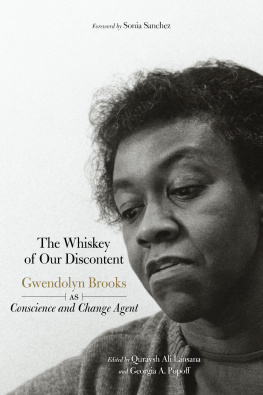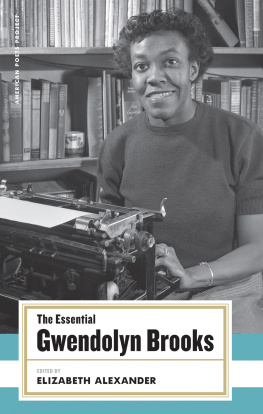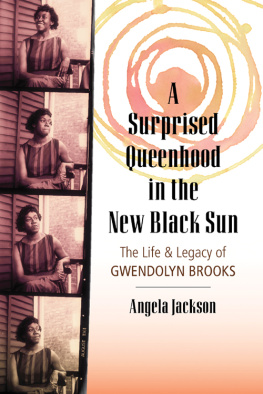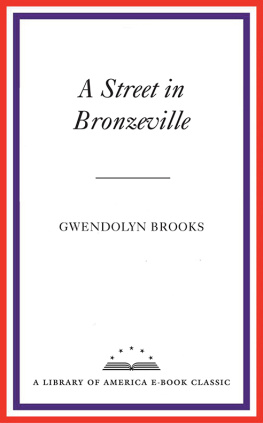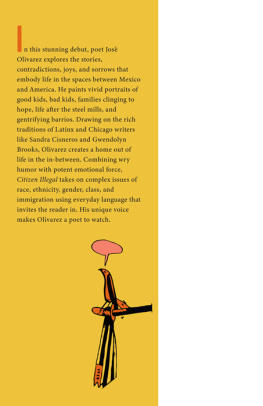Contents
: This Gwensister Called Life Sonia Sanchez
Quraysh Ali Lansana and Georgia A. Popoff
William Ayers
Tara Betts
Antoinette Brim
R. J. Eldridge
James Allen Hall
Troy Harden
Judith Harris
Ciara Darnise Miller
Patricia Spears Jones
Christina Pugh
Keith S. Wilson
Demetrice A. Worley
David Baker
Carl Phillips
Meghan ORourke
Jill Hawkins
Dasha Kelly
Adrian Matejka
Georgia A. Popoff
cin salach
Clifford Thompson
Emma Vallelunga
Nagueyalti Warren
avery r. young
John H. White
Major Jackson
Quraysh Ali Lansana
Haki R. Madhubuti
Foreword
This Gwensister Called Life
Sonia Sanchez
you tell the stars
dont be jealous of her light....
This is an introduction, yo s (i know)
This is an introduction, yo lo s ( i know it )
about Sister Gwens words, heavy as stones,
beautiful black stones, coming from the sea,
caressing our skins with color,
rinsing our bones where sainthood
might be possible
This is an introduction about hands
yo s (i know), yo lo s (i know it), yo s (i know)
her hands anointing Blacks
sequestered in an American hunger impossible to satisfy.
And she whispered us to attention
with what could be....
She said Venga . Come . vivir. to live . hablar sin bastn . to speak without a cane .
And we came reimagining ourselves on this
American landscape.
And we came because her words exonerated us from crimes in front of the world
And we came as we caught her tongue embroidered with pyramids,
And we moved away from graveyards to our own births.
And she came, woman of trees and parasols
And she came, woman of prophesy and praise
And she came towards us
And she came womanclear ....
you tell the morning
to ease her into a water
fall of dreams
for she is a holy one...
L anguage itself, in a broad sense, is a symbol of the thought interaction of a people, although it is designed primarily to communicate experiences in fundamental ways. Poetry , on the other hand, is the symbol or essence of language designed to sensitize meaning, motivate, create, or re-create experience, and bestow a state of perception not ordinarily experienced or not experienced in an ordinary way.
The poet, even though she or he speaks plainly, is a manipulator of symbols and language images that have been planted by experience in the collective subconscious of a people. Through this manipulation he or she creates new or intensified meaning and experience, whether to the benefit or detriment of his or her audience. This poetry is what I call subconscious conversation : it is as much the work of those who understand it as of those who make it.
And make it she does. This poet. Woman. Sister Gwen. She reminds us of Du Boiss saying: This is a beautiful world; this is a wonderful America, which the founding fathers dreamed until their sons drowned it in the blood of slavery and devoured it in greed . With her words. Her poetry. Her genius. She demands/requests that we, her children, must help rebuild it. This America in so much disrepair.
She does what Frantz Fanon wrote. She holds herself like a sliver, to the heart of the world. She stands up to the world. She does battle for the creation of a human worldthat is, a world of reciprocal recognition.
So we learn from her words that the enemy is not a few men or women, but a system. We praise her because she has taught us that vengeance is not the point. Change is. Education is. Freedom is. Social and sexual justice is. Love is.
When one day your children ask, What did you do? When they rise like the Guatemalan poet Otto Ren Castillo rose and asked us what we did when our nation died out slowly, like a sweet fire, small and alone. When they will ask us: What did you do when the poor suffered, when tenderness and life burned out in them? We the lovers of selves, the lovers of justice and freedom and democracy will turn and say, we resisted like Sister Gwen resisted .
I know that one of the words given to us a long time ago was resist; it is an ancient word, a holy word, a churchgoing word, a womanist word, a gay word, a political word, a lesbian word, a word to teach to our children. All children. As they enter into the world. It is a word to teach ourselves as we hummmmmmm ourselves into existence each morning. Giving praise that a woman named Sister Gwendolyn Brooks walked on this earth. Singing eyes. Singing hands. Singing life. Singing poems, alarming the death singers that she had come to celebrate life... life... life...
Woke up this morning with my eyes on Sister Gwen
I say, Woke up this morning with my eyes on Sister Gwen
Woke up this morning with my eyes on Sister Gwen
Gonna Resist , Gonna Love , Gonna Resist
Just like her...........
you tell the ocean
you call out to Olokun
to bring her always
to safe harbor...
For a long time Ive pondered this thing that we do called writing. Ive looked at my words sometimes as if they belonged to a stranger. The truth is as you grow older, as time passes, you stare at some of your words as if you have only a passing acquaintance with them. But each time I read Miss Brooks, each time I revisit her poems, they climb up on my knees and sit in tight contentment. They speak to me of form and color, patterns and dawns. They talk of myths; they tell me where flesh lives, where a troop of young heroes and sheroes lean back in chairs, beautiful. Impudent. Ready for life. Where the young Live not for battles won. / Live not for the-end-of-the-song. / Live in the along.
I never have to ask where are the flowers? Sun? Where are the mothers? Fathers? Where are the old-marrieds? Where are the children adjudged the leastwise of the land? Where are the riots? The Sermon on the Warpland? Where are the prophets? Where is Pepita? Where are they who flail in the hot time? Where is the sound that we are each others harvest?
I see them in her poems that breathe women in a blaze of upsweeps and backyards and ballads, in her children dancing between urine and violets, in her singing to us between the sleeping and the waking.
I have gotten lost sometimes in this journey called life, in which nothing moved, when I gathered up our daytime hysteria, when I looked at the countrys delirium, when I tried to disagree with my blood, and I heard her poems turning away from funerals, feasting on rain and laughter, walking toward life with serious hands, heard her footsteps gathering around us, and she came tongued by fire and water and bone, and she came from where the drum sings, and she came reclaiming our most sacred ashes, and her love carved the journey of this womansail.
And as she entered into our twenty-first-century bloodstream, paddling a river of risks, she became the color of bells, set sail on the wind, and sailed home. Said hello to our own good-byes.
Preface
Quraysh Ali Lansana and Georgia A. Popoff
J une 2017 marks the birth centennial of Gwendolyn Brooks, one of the twentieth centurys preeminent poets and voices of social justice. The Whiskey of Our Discontent is a collection of writings celebrating her art and influence. One of the finest practitioners of the craft of prosody, she also possessed a keen knowledge of the canon of Western poetry. Ms. Brooks holds a place at the top of the list of major African American writers, national educators, and conscious chroniclers of American society and the Black American experience.
A bold and compassionate voice with an extraordinary perspective, Ms. Brooks explored an ever-changing political climate, confronting oppression and illusion over the course of her lifetime. In her quest to hold up a mirror to the worlds she witnessed and to closely capture the daily communities she navigated and inhabited, she created poetry that skillfully addressed issues of race, gender, class, community, and culture in ways that spoke to a diverse audienceeven reached the mainstreamwhile never losing her connection with home .
Next page
